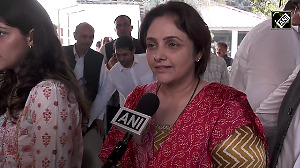A leading Chinese scholar has demanded that India should make its atomic programme"transparent" and questioned its status as a legitimate nuclear weapon state, in a commentary that comes in the midst of intense media focus on reports of Chinese incursions along the border.
"The issue is that India is not only a country that wants to develop civilian nuclear power, but also a nation that has developed nuclear weapons," says Zhao Gancheng, director of the influential Centre of South Asia Studies at the Shanghai Institute for International Studies.
"Thus others are concerned not about whether India could develop civilian nuclear reactors to generate electricity, but whether it is or should be seen as a legitimate nuclear
weapons state (NWS)," Zhao says in a commentary in the state- run Global Times, a sister publication of the ruling Communist Party's mouthpiece, People's Daily.
As a non-signatory state to the Nuclear Non-Proliferation Treaty (NPT), India's extensive search for sources of nuclear materials has attracted attention worldwide, he writes.
While India wants to develop nuclear programmes, the potential for them to include nuclear weapon improvement in both quality and quantity naturally leads to "suspicion," he says.
"At the end of the day, India cannot be the nation that triggers or worsens any possible arms race in South Asia. For that simple reason, India must make its nuclear plans transparent to the international community."
Zhao says that since the US-India civilian nuclear deal was made, the international community has debated legitimacy of India's development of its civilian nuclear power.
While agreeing that India, just as any other state, has the right to develop and use nuclear energy, which would reduce India's consumption of coal and oil and make a contribution to controlling global warming, he writes that this is not the end of the issue.
He said the US-India civilian nuclear deal was aimed at solving the problem by acknowledging India's legitimate status to cooperate with other countries in civilian fields without having to clarify India's status as a nuclear weapons holder.
Despite India's legitimacy in purchasing nuclear materials from the global market, the question remains whether India would stick to the principle of not developing nuclear weapons further, because the US-India deal does not actually solve the problem, he says.
Now that India has acquired a legitimate status in the civilian nuclear market, India's relevant nuclear programs are expected to progress further, Zhao writes.
As a de facto Nuclear Weapon State, India will become a crucial element in the future. The international community would certainly expect India to play a responsible role in the region, and in the world at large, he writes.
"Regional stability fits India's interests, and even the possibility of an arms race would harm all parties involved," he says adding, it can be hoped that India's access to global market for nuclear fuel will help create more stability, and a lasting peace in South Asia.








 © 2025
© 2025